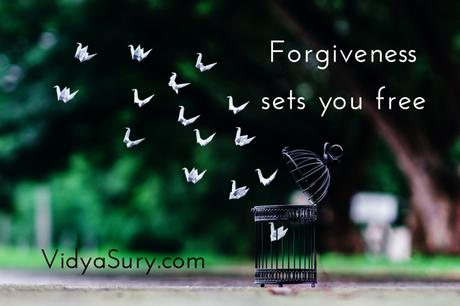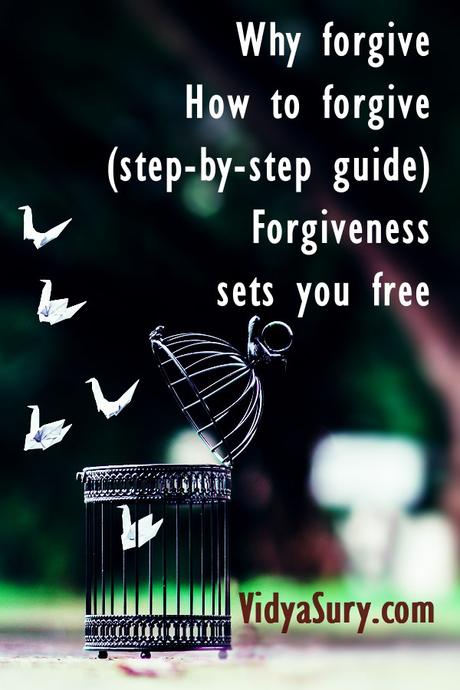
Forgiveness is a tool for healing.
To forgive is to set a prisoner free and discover that the prisoner was you.
Life isn't perfect. And like it or not, getting hurt is part of it. When it is unintentional, of course we wish we could rewind time and delete what happened.
Well, the next best thing is practicing forgiveness.
I know forgiving doesn't always come easily when we feel hurt and wronged. Why, every time my Mom serenely told me to let it go, forgive, I wasn't always comfortable with that. I'd think-how can sheforgivenes be so cool about the injustice in her life? How can she smile and shrug off people being nasty, saying hurtful things?
Sometimes, friendships/relationships break up over a misunderstanding and the people involved make their own assumptions about why things came to pass. The feeling of being let down stays. There's finger pointing.
And all the while, the anger, or some form of it festers inside.
The problem, however, is this. While anger feels good and venting feels therapeutic, keeping it eats away our happiness. We end up wasting precious energy we need for other important things. We become unhappy.
Over the years, I've realized that the longer I harbor a grudge and refuse to forgive, the more miserable I feel. And who wants to nurture that feeling of misery? Better to calm down, and yes, you guessed it, forgive.
We are fortunate to have a choice: come to terms with the situation and release the painful memories so we can move on with our lives.
Easier said than done, right?"Forgiveness is not something we do for other people; we do it for ourselves - to get well and move on."
I don't know about you, but I remember thinking, a long time ago, that forgiving someone lets them get away with what they've done.
Right?
Not true.
Forgiveness is all about releasing the suffering so we can feel better. And suffering is nobody's favorite feeling.
Life is too precious to put yourself through the torture of hanging on to sad stuff. And yes, life IS unfair sometimes. So-why add to it by lugging that baggage around?
Set yourself free.
If you are still sitting on the fence, wondering why you should forgive, here are some solid reasons:
- You feel much better, liberated. Once you forgive, the resentment that was eating away at you leaves you. You let go of the pain. This makes life better.
- It is healthy to forgive. Resentment and anger cause extreme stress and this affects your health. Stress causes disease. You are aware that our mind body connection translates what we think into what we feel. When you forgive, it frees you from stress. It keeps your blood pressure in check, and your immune system healthy. Your lower your chances of developing back pain, headaches and tummy aches.
- When you forgive, people like you more. Now think: would you approach someone who looks like she's full of grudges or someone who looks at peace with herself?
- Forgiveness keeps off that feeling of misery every time you think about how hurt you felt-simply because you've dealt with the situation.
- When you obsess over the negative, it can result in mental health issues. Of course it is not easy to forgive. But the price you pay by not forgiving is too high-emotional and physical stress, unhappiness.
"Anger makes you smaller; while forgiveness forces you to grow beyond what you were"

How to practice forgiveness?
One of the best ways to forgive is by practicing gratitude
Gratitude is a wonderful way to start practicing forgiveness as it allows us to focus on the good things and appreciate what we have. It gives us a fresh perspective on things, encouraging us to forgive.
Try looking at the situation from a different angle. Instead of feeling like the victim, why not see ourselves as survivors?
To forgive, you have to be objective. Ditch the blame game.
And as annoying as it sounds, walk in the shoes of the person who hurt you.
See both sides of the story.
A step by step process to practice forgiveness
First, think about what happened. What was it that really hurt you? Talk to a trusted friend.
Now, do the following:
- Allow yourself to feel better. Forgiveness is for you. Not for anyone else.
- Understand the fact that forgiveness is not about reconciling with the person who hurt you or accepting what happened as okay. The goal here is to find peace, not take it personally. To change your perception of the situation.
- It is important to see things from the right perspective after you get over the initial feelings of hurt and being upset.
- Here's something that's crucial: let go of your need to get even with the person who hurt you.
- Choose to be compassionate.
- Now, time to move on.
I know it is a challenge, but one that's well worth it. When you choose forgiveness, you choose not to be consumed by anger, bitterness and other toxic feelings that have larger repercussions on your health.
Forgiveness takes time
Naturally. Practicing forgiveness brings down the anger and stress. It fills you with hope and peace. It encourages healthy relationships. There's an attitude of kindness and love, not bitterness.
When you choose not to forgive, it drains your energy, keeping you focused on the negative. It keeps you stuck in the past. It holds you back from who you can be.
When you release feelings of hurt helps divert valuable energy on what you want, rather than be stuck in that warp of what hurt you.
There's an ancient forgiveness process followed by the Hawaiians.
They call it ho'oponopono.
This practice promotes a feeling of peace and calm towards a person or a situation, taking you to a state of harmony. It helps release resentment, anger and hurt that block the energy in our bodies.
How to practice ho'oponopono?Ho'oponopono is an interactive process that works around the principle of giving and receiving. Here, both parties say "I forgive you. Please forgive me" to each another.
- Both parties say all they have to say to each other and get their feelings out in the open without interrupting each other. They accept each other's feelings and statements.
- The next step is sending love to the person. It suggests opening your heart and offering love and compassion, both to yourself and the other person.
- Finally let go of the hurt while keeping the learning.
The whole idea of ho'oponopono is to forgive the person and self, release all negative emotion and thought and move on.
Hmm.
Years ago, when I talked to my son about this, he asked me this question:
What if I don't feel like forgiving?
Tricky, eh?
I confess I go through this sometimes, and I think it is fine not to forgive especially with some things that are hard to forget-but there's a caveat: let go of all feelings of revenge. If you can, let things be. Whether or not the hurt was justified, for our own good, it is better to initiate healing. Try to come to terms with the situation. I'd think that as long as we don't nurture mean feelings for them, it is as good as forgiveness, right?
Life is short. Forgive and heal yourself. Question for you: What are your views on forgiveness? Do you think it is easy? Tough? Worth it?
